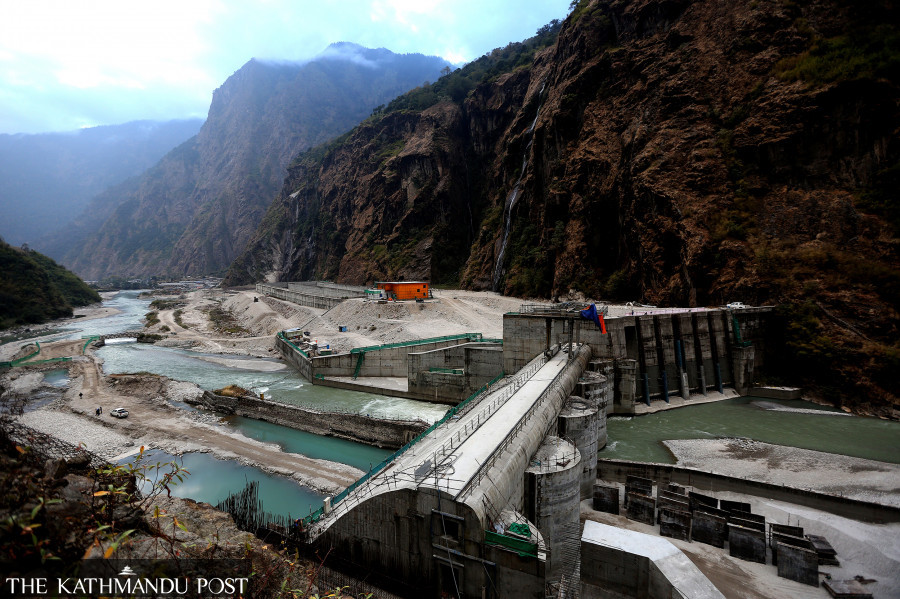National
Electricity authority may scrap bid to buy power from India under six-month deal
NEA’s reluctance to buy energy citing higher price quotations may constrain supply in winter when domestic outfall falls.
Prithvi Man Shrestha
Nepal’s first-ever effort to buy electricity from India through competitive bidding for long-term power supply may not materialise as the Nepal Electricity Authority finds the prices quoted by Indian sellers higher than expected.
Though the state-owned power utility is yet to decide on the matter, at least two officials told the Post that the probability of cancelling the bid is high.
The NEA has been buying power from the day-ahead market of Indian Energy Exchange Limited, a trading platform, after the Southern neighbour in April 2021 opened its market to Nepal only for selling electricity to Nepal.
Nepal relies on electricity from India in the dry season (December-May) to meet the higher demand when domestic plants cannot generate power up to their capacity.
The power utility has sought to buy electricity from the open market of India for six months besides continuing to buy from the day-ahead market under which prices for the next day are determined the previous day and the electricity is traded on a daily basis at different rates.
Issuing a tender notice on September 9, the NEA said that it would buy up to 365 megawatts from Indian traders from December 1 to May 31.
“Probably we will not buy electricity from India under a longer-term deal because the prices quoted by the bidders appear to be higher than what we had expected,” said Suresh Bhattarai, spokesperson for the NEA. “We may have to clarify if we buy power despite high prices.”
According to Kul Man Ghising, managing director of the NEA, four Indian bidders—NTPC Vidyut Vyapar Nigam, PTC India Limited, Manikaran Power Limited and another Indian company—participated in the bids to sell power to Nepal in the wet season in a six-month deal.
“The prices quoted by them range from INR 7 (Rs11.2) to INR 8.5 (Rs13.6) per unit,” said Ghising, adding that the rates are too high compared to the NEA’s standards.
He, however, said that the NEA has not made any decision on whether to award a contract or scrap the bids. “We are currently in internal consultations,” he told the Post.
Nepal is receiving an average price of just over INR4 per unit in the day-ahead market of India’s power exchange, according to the NEA.
When Nepal resumed selling power to India's exchange in June, the average price was more than INR 7 per unit,” Bhattarai said.
As per the bid document, the NEA planned to buy 265MW from December this year to February next year and 365MW from March to May.
It planned to buy 65MW through the Tanakpur delivery point for six months, and 200MW from Muzaffarpur delivery point from December to February and 300MW from March to May.
Though Nepal has been exporting electricity currently because of surplus output by the plants fed by monsoon-swollen rivers, the country needs to import power in winter when water levels fall and the plants produce only 30 to 40 percent of their installed capacity.
Currently, the total installed capacity of Nepal’s power plants exceeds 2,200MW while the peak-hour demand remains just over 1,300MW, down from around 1,800MW at its highest, according to the NEA.
According to the state-owned power utility, the main reason behind its plan to buy from the open market of India under a longer-term deal is to diversify the risk.
“When Nepal relied on the day-ahead market to import power from India in the last dry season, we could not import as much as we wanted,” Jayaraj Bhandari, chief of the economic analysis division of the NEA, told the Post in September.
The NEA was forced to cut power supply to some industrial corridors from March to May due to reduced supply from India as the southern neighbour itself failed to produce enough electricity amid a global shortage of coal.
Coal accounts for nearly 75 percent of India’s power output. Several Indian states had imposed load-shedding amid rising demand for power.
In late March, India had stopped providing power through the Kushaha-Kataiya cross-border transmission line and the Parwanipur-Raxaul cross-border transmission line under the fixed price regime in the night time. The southern neighbour has stopped providing electricity at a fixed rate from Tanakpur since mid-February.
If the NEA fails to buy power under a long-term deal, it will be another failure on its part after scrapping the plan to sell 200MW to India under a long-term agreement in July.
Citing legal complications after one of the bidders quoted “unsatisfactory” prices, Nepal’s power utility had abandoned its plan to sell electricity under a five-month-long power purchase agreement.
“The NEA’s failure to award contracts under long-term deals consecutively will erode its credibility among the Indian power trading firms,” said Ashish Garg, vice-president of Independent Power Producers’ Association of Nepal.




 21.12°C Kathmandu
21.12°C Kathmandu














